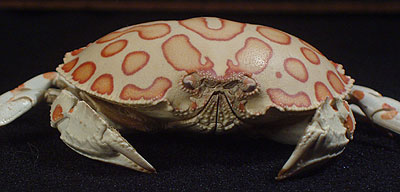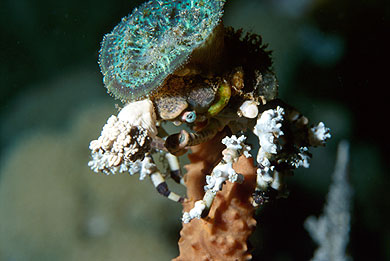
The Zymoglyphic Museum's Arthropod Division has recently expanded its Crabs of the World collection with a shipment from Conchology, Inc. of the Philippine Islands. The museum's original collection has been a miscellany of eBay, shell shop, and other purchases, not always with proper identification. A recent concerted effort for taxonomic accuracy in identifying its various specimens has been aided by a number of helpful folks at The Crustacean Society.
Crabs have an important place in Zymoglyphic culture. When dead, they often look as though they are just posing for a really long time, and so make excellent diorama characters. They are the stars in the traveling crustacean mini-diorama, as well as supporting actors in many of the museum's aquatic dioramas. They are nautical mechanical marvels, from the tight, interlocking parts of a box crab to the implausibly leggy spider crabs. Some, such as the fiddler crab, verge on becoming "eccentric contraptions", surreal beings whose very existence seems impossible. Some have great character, such as the leopard crab shown above.

In previous entries, we have featured as "natural assemblage artists" the bowerbirds, who collect and arrange various objects to attract mates, and the Xenophora, shellfish which collect and arrange other shells on themselves. Decorator crabs take the latter idea further and make themselves into living, walking gardens. They cover themselves with a selection of living seaweed and plant-like animals, such as sponges, corals, and bryozoans. This is not a weed garden in the sense of just allowing things to grow on the carapace; the selections are carefully nipped and placed on specialized projections on the shell. The purpose is both camouflage and protection due to the poisonous nature of many of the selections. The festively decked-out crab shown here is a Cyclocoeloma tuberculata (photo from edge-of-reef.com).
If you are in the Seattle area and interested in crustaceans, there is an excellent collection at the shell museum in Port Gamble, a ferry ride across Puget Sound from Seattle.
No comments:
Post a Comment